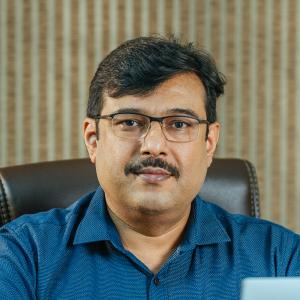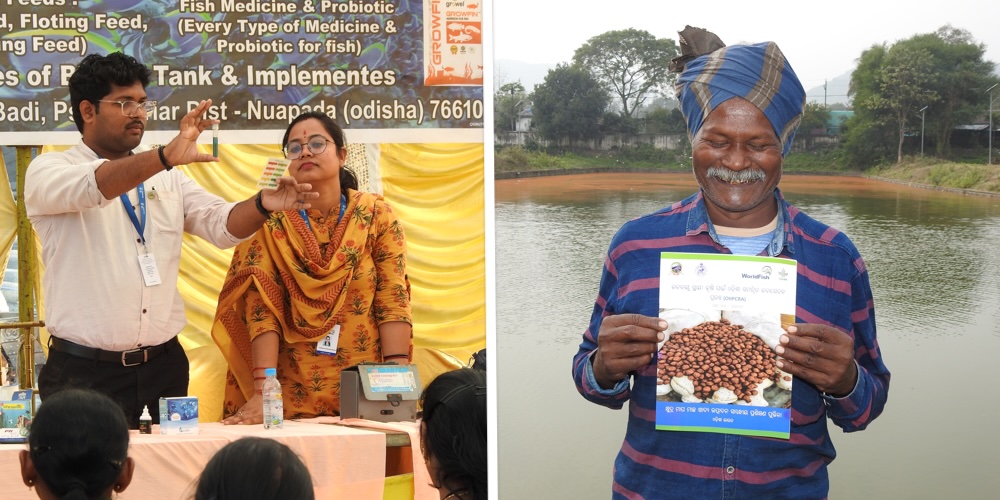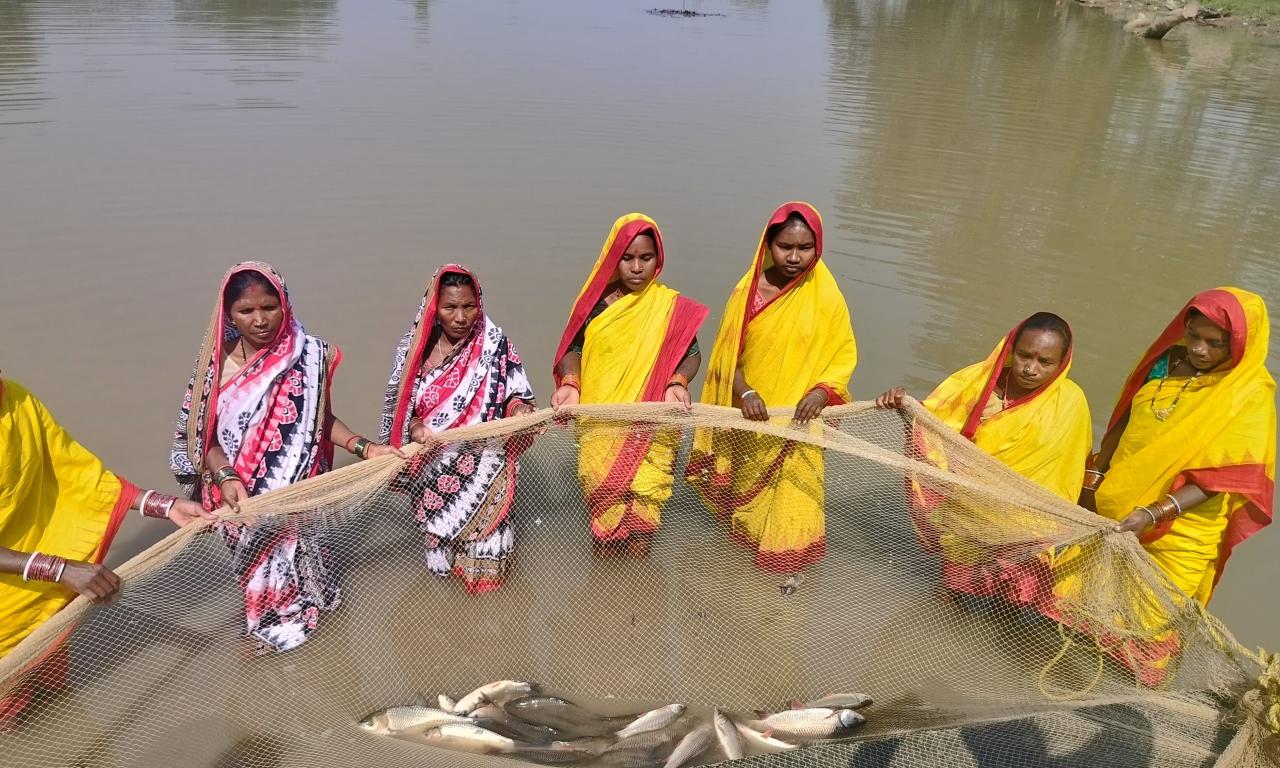
In Odisha, India, farmers and fishers are on the frontlines of the climate crisis. However, with the support of the Odisha Integrated Irrigation Project for Climate Resilient Agriculture (OIIPCRA), supported by the World Bank and implemented by the Odisha Community Tank Development and Management Society (OCTDMS), they are not just adapting to these changes, they are transforming how they farm, manage water, and gaining the tools they need to build a more resilient future.
Running from 2019 to 2025, OIIPCRA’s goal is to intensify and diversify agricultural production, enhance climate resilience, and improve water productivity in key areas across Odisha. The project directly benefits small and marginal farmers, fishers’ cooperatives, Pani Panchayats (PPs), and agricultural entrepreneurs, with a special focus on empowering women and vulnerable groups.
In partnership with WorldFish, OIIPCRA is also driving innovation in the aquaculture sector by improving fish farming practices, boosting livelihoods, and promoting environmental sustainability. These interventions increase food security and help communities build climate-resilient aquaculture systems that can withstand the pressures of a changing climate.
Below are the key interventions highlighted under the Aquaculture sub-component of the project:
Empowering Women through Scientific Fish Farming in Minor Irrigation Projects (MIPs)
One of the standout achievements under OIIPCRA has been the empowerment of women through scientific fish farming in Minor Irrigation Projects (MIPs). Between 2022 and 2024, 418.4 hectares of water spread area (WSA) were brought under this innovative practice, directly benefiting 1,500 women. The initiative aimed to teach women advanced fish farming techniques, helping them become self-reliant entrepreneurs. As a result, fish production increased significantly, reaching 292 tonnes, generating an impressive Forty Million Rupees in revenue. This intervention not only empowered women economically but also enhanced their social standing within their communities.
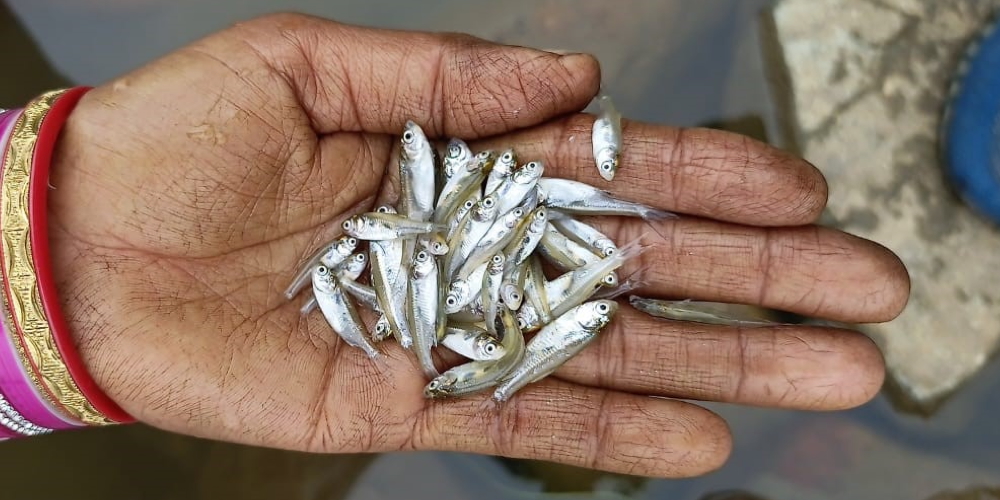
Early Breeding of Indian Major Carps (IMC)
OIIPCRA introduced early breeding techniques for Indian Major Carps (IMC), a crucial fish species in Odisha's aquaculture sector. Implemented across 28 hatcheries, these advanced techniques produced 2,855.1 million of spawns. The early breeding not only increased the availability of quality fish seed but also extended the breeding season, ensuring consistent production. This intervention has enhanced productivity and income which has had a profound impact on both hatchery operators and fish farmers.
Freshwater Prawn Culture
Freshwater prawn culture emerged as a promising new venture under the aquaculture component of OIIPCRA. This monoculture system was developed across 13.8 hectares, producing 3,105 kg of prawns and generating nearly One Million rupees in revenue. The culture of freshwater prawns has proven to be a lucrative source of income, with minimal environmental impact. Prawn farming has been integrated with other aquaculture systems, providing an additional income stream for farmers while maintaining sustainable practices.
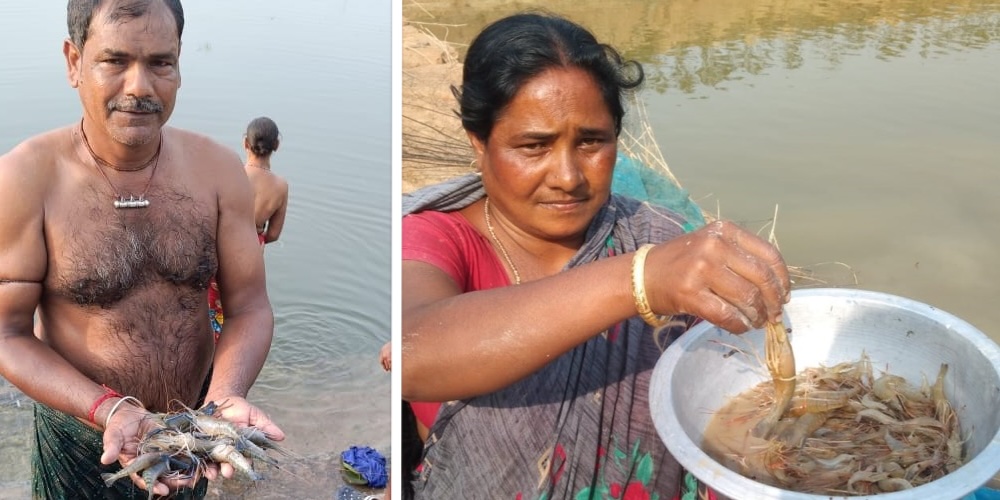
WorldFish's Role
WorldFish has played a pivotal role in the successful implementation of these interventions through;
- Capacity Building: WorldFish provided technical support, training and capacity-building programs for local fish farmers, women’s groups and hatchery operators. This ensured the adoption of scientific methods in fish farming and helped local communities develop their aquaculture skills.
- Research and Innovation: WorldFish introduced cutting-edge techniques such as early breeding of Indian Major Carps and the development of climate-resilient aquaculture systems like Rice-Cum-Fish Culture. Their research-driven solutions have helped improve productivity while ensuring sustainability.
- Women’s Empowerment: Recognizing the role of women in aquaculture, WorldFish supported initiatives focused on empowering women through training in fish farming and entrepreneurship, which has had lasting impacts on their livelihoods and social status.
- Sustainability: WorldFish emphasized sustainable aquaculture practices, ensuring that all interventions were aligned with ecological conservation and long-term environmental sustainability. The promotion of nutrient-rich fish species like Mola also addressed malnutrition, reinforcing the project's holistic impact.
The Way Forward
Looking ahead, the success of these interventions paves the way for further development and expansion.
Key areas for future focus include;
Scaling Up Successful Models: The positive results from scientific fish farming in MIPs, early breeding techniques, and freshwater prawn culture should be expanded to other regions in Odisha and beyond. Scaling these models will enhance fish production, improve income levels, and create new livelihood opportunities for more communities.
- Strengthening Women's Participation: Building on the success of women’s empowerment programs, further investments should be made to increase the involvement of women in leadership roles within aquaculture. Providing more women with access to resources, training, and market linkages will boost their participation in the sector.
- Promoting Climate-Smart Aquaculture: The integration of rice and fish farming, along with the promotion of climate-resilient species like Mola, should be prioritized to combat the adverse effects of climate change. Strengthening these practices will improve food security, enhance nutrition, and promote sustainable agriculture.
- Expanding Research and Innovation: Ongoing research into advanced breeding techniques, water management systems, and disease control is crucial for maintaining productivity and ensuring the long-term sustainability of Odisha’s aquaculture sector.
- Market Development: Developing efficient market systems and value chains for fish products is essential for maximizing the benefits of aquaculture. Efforts should be made to link small-scale farmers and cooperatives with larger markets, ensuring fair prices and enhancing profitability.
By continuing to collaborate with organizations like WorldFish and investing in innovative, sustainable practices, Odisha’s aquaculture sector can further contribute to the state’s economic growth, social development, and environmental conservation.

